Related Research Articles

The Saskatchewan Party is a centre-right political party in the Canadian province of Saskatchewan. Since 2007, it has been the province's governing party; both the party and the province are currently led by Premier Scott Moe. The party was established in 1997 by a coalition of former provincial Progressive Conservative and Liberal party members and supporters who sought to remove the Saskatchewan New Democratic Party (NDP) from power.

The 2003 Saskatchewan general election was the twenty-fifth provincial election held in the Canadian province of Saskatchewan. It was held on November 5, 2003, to elect the 58 members of the Legislative Assembly of Saskatchewan (MLAs). The election was called on October 8 by Lieutenant Governor of Saskatchewan Lynda Haverstock, on the advice of Premier Lorne Calvert.

The Saskatchewan Liberal Party is a Centre-right political party in the Canadian province of Saskatchewan.

James Garfield "Jimmy" Gardiner, was a Canadian farmer, educator, and politician. He served as the fourth Premier of Saskatchewan, and as a minister in the Canadian Cabinet.
This is a list of results of leadership elections for the Ontario Liberal Party, a political party in Ontario, Canada.

The Honourable Lynda Maureen Haverstock, OC, SOM is the former leader of the Saskatchewan Liberal Party, was a member of the Legislative Assembly of Saskatchewan, and served as the 19th Lieutenant Governor of Saskatchewan from 2000 until July 2006. In 2007, she was named President/CEO of Tourism Saskatchewan.
This page lists the results of leadership conventions held by the British Columbia Liberal Party.

The 1921 Saskatchewan general election was the fifth provincial election held in the Canadian province of Saskatchewan. It was held on June 9, 1921, to elect members of the Legislative Assembly of Saskatchewan.

The 1995 Saskatchewan general election was the twenty-third provincial election held in the Canadian province of Saskatchewan. It was held on June 21, 1995 to elect members of the Legislative Assembly of Saskatchewan.

The 1999 Saskatchewan general election was the twenty-fourth provincial election held in the Canadian province of Saskatchewan. It was held on September 16, 1999 to elect members of the 24th Legislative Assembly of Saskatchewan.

George Harry Webster was a politician and transportation expert in Alberta, Canada. He served as the 22nd Mayor of the city of Calgary, Alberta from 1923 to 1926 then served as a member of the Legislative Assembly of Alberta from 1926 to his death in 1933. Webster was popularly known as the "Cowboy Mayor".

The 1948 Liberal Party of Canada leadership election was called to replace retiring Liberal leader and sitting Prime Minister William Lyon Mackenzie King. The convention was held exactly 29 years after the 1919 leadership convention that saw King elected Liberal leader.
The 24th Legislative Assembly of Saskatchewan was elected in the 1999 Saskatchewan election. It was controlled by the New Democratic Party under Premier Roy Romanow. Romanow resigned as New Democratic Party leader in 2001 and was succeeded by Lorne Calvert for the remainder of the 24th Assembly.
David Gordon "Davey" Steuart was a Saskatchewan politician, cabinet minister and Senator.
Ronald (Ron) Osika is a Canadian former politician, who served in the Legislative Assembly of Saskatchewan from 1995 to 2003.
This page lists the results of leadership elections held by the Alberta Liberal Party. Delegated conventions were held until 1988. Elections held since 1994 have been on a One member, one vote basis.

The 1919 Liberal Party of Canada leadership election was the first leadership convention held by a federal political party in Canada. It was originally called by the Liberal leader, Sir Wilfrid Laurier, as a national policy convention with the intention of reinvigorating the Liberal Party after eight years of being in opposition. The convention was also intended to re-unite the party, which had split as a result of the Conscription Crisis of 1917. The party had divided into Laurier Liberals, who remained in opposition, and a Liberal–Unionist faction which joined the wartime Union government of Sir Robert Borden in support of conscription. Laurier's death on February 17, 1919 resulted in the meeting being reconfigured as a leadership convention. Previous party leaders in Canada had been chosen by the parliamentary caucus or the outgoing leader. However, the Liberal caucus no longer felt that it was representative of Canada's linguistic and religious diversity and that allowing the entire party to select the leader would result in a more representative choice.
The 5th Legislative Assembly of Saskatchewan was elected in the Saskatchewan general election held in June 1921. The assembly sat from December 8, 1921, to May 9, 1925. The Liberal Party led by William Melville Martin formed the government. After Martin retired in 1922, Charles Avery Dunning became Liberal party leader and Premier. The former leader of the Conservative Party, Donald Maclean had left politics to serve as a judge shortly before the election. The opposition in the assembly was unorganized and there was no official opposition leader in 1921 or 1922. Independent member John Archibald Maharg served as leader of the opposition in 1923 and Harris Turner, also independent, served as opposition leader in 1924 and 1925.
The 17th Legislative Assembly of Saskatchewan was elected in the Saskatchewan general election held in June 1971. The assembly sat from July 28, 1971, to May 13, 1975. The New Democratic Party (NDP) led by Allan Blakeney formed the government. The Liberal Party formed the official opposition. After Ross Thatcher's death in July 1971, David Steuart became party leader in December 1971.